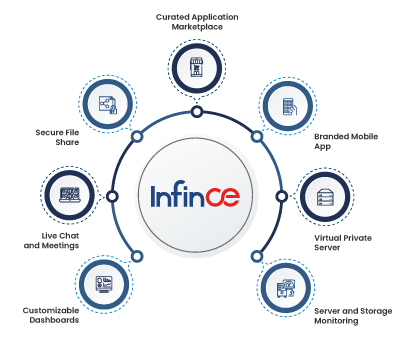Of course, AI is driving headlines across all industries today. But, quietly in the background, the cloud has become an essential mandate for digital organizations. In 2020, enterprise cloud suites were just 9% of global IT spending. However, 2024 tells a very different story.
A 2023 Gartner report suggests global cloud spending will hit $678.8 billion by 2024, up from $563.6 billion in 2023. The report also indicates that cloud budgets will overtake traditional IT spending in 2025.
Therefore, the key takeaway for organizations today is that to stay relevant, they must go a mile ahead of just dipping a toe in the cloud!
Why Does Your Cloud Suite Decision Matter?
Even more so, choosing the right enterprise cloud suite is a critical decision that can have long-term consequences for your business. How enterprise cloud suites transform business operations is a key consideration, as agility, scalability, and security become increasingly important. Your chosen cloud suite must align with your business goals and operational needs. As a digital organization, you must identify a solution that meets your current requirements and has the flexibility to grow and adapt as your business evolves.
That said, choosing the right enterprise cloud platform involves more than just a technology decision; it’s closely tied to long-term business strategy. Add to the mix issues like vendor lock-in, where your business becomes too dependent on a single provider. This limits flexibility and raises costs.
This guide is your go-to as we help you assess key criteria while deciding on your enterprise cloud software. When you make the right decision, you set yourself up for long-term success.
Key Considerations While Choosing Your Enterprise Cloud Suite
Let’s start with a disclaimer. Not all cloud suites are created equal. So, what works for one company may not be the best fit for another. The first criterion, therefore, is always to ensure that the enterprise cloud platform you choose aligns with your unique business objectives, especially when addressing the technology challenges of small businesses. Here are a few other criteria to consider,
1. Scalability and Flexibility
A scalable cloud platform is not just about handling more users or data volumes. Your cloud suite should be able to grow and adapt to your organization. For new market expansion, product or service offerings, or seasonal fluctuations, your cloud suite must have all bases covered without significant disruption. When your cloud solution is scalable, it can help your business rapidly recover from disasters and system failures.
Consequently, this can minimize disruption and maintain business continuity. Imagine an incident like the recent Crowdstrike, and a scalable cloud platform can save you millions of dollars in revenue. Scalable cloud platforms are also useful in reducing disaster recovery costs by eliminating the need for a secondary data center. Businesses can analyze and process data to gain insights and make decisions faster when your enterprise cloud solution is built for scalability.
2. Security and Compliance
The average data breach cost today is approximately $4.45 million. A no-brainer, robust security features are critical to a successful enterprise cloud software. However, identifying solutions with in-built security mechanisms and ensuring they cover the full spectrum of potential cybersecurity breaches is a far cry. Add to the mix the complexity of compliance on the cloud. Additionally, compliance with industry-specific regulations (such as GDPR, HIPAA, or SOC 2) is crucial, especially for businesses operating in highly regulated sectors like healthcare and finance.
To begin with, factor in how your data is used within the cloud platform. Look for cloud software that offers data management within a secure environment and manages data with utmost exclusivity. Make sure your cloud suite has in-built enterprise-grade security norms protecting data in transit and at rest Starting with a minimum viable cloud and building around that can be suitable since every organization has unique requirements, and cloud adoption doesn’t need to be a ‘big bang’ from the start. That’s where customizability comes into play.
Read More: Ebook: The Ultimate Intranet Buyer’s Guide!
3. User Experience and Accessibility
Ask any modern employee today to list their problem points with internal software in their digital workplace. You’ll likely hear all of them dealing with legacy IT infrastructure. Endless help desk tickets, lack of integration, recurring security issues, and frequent downtime and disruptions. All of this can be tackled efficiently with an enterprise cloud platform.
Users can have a seamless user experience rather than going through upgrades piecemeal. Your cloud suite should be intuitive and easy to follow so your employees can quickly adapt and use it to its full potential. Steep learning curves can be a significant deterrent, making it complex and inaccessible. Employees should be able to access the cloud suite from any device, anywhere, at any time. This is particularly important in today’s hybrid work environment, where flexibility is key. An enterprise cloud suite offering a mobile experience can enhance productivity and ensure your team stays connected, regardless of geographic location.
4. Collaboration Tools
With hybrid workplaces, inefficient workplace technology can impede an employee’s ability to collaborate well and hampers overall productivity. When choosing an enterprise cloud suite, collaboration, and real-time internal communication should be considered two arm rails driving the entire cloud platform. A McKinsey study reports that organizations prioritizing collaborative working environments are 5 times more likely to be high-performing.
Don’t go by just ticking off checkboxes for must-have features but understand how shared workspaces and integrated communication channels can benefit your teams. Choosing the right collaboration suite means finding tools that fit your team’s needs, integrate seamlessly with existing workflows, and support both real-time and asynchronous work. The best tools simplify tasks, foster innovation, and help teams work smarter, not harder.
5. Comprehensive Support and Training
Investing in a new enterprise cloud solution significantly affects your bottom line. It is not a one-and-done activity but one that requires constant follow-up. Ergo, look for an enterprise solution that offers comprehensive support services, including 24/7 technical assistance, a dedicated account manager, and a robust knowledge base. Not to forget, training is another critical component—your team should be equipped with the skills and knowledge they need to make the most of the cloud suite’s features.
To Conclude
The cloud isn’t only a future-proof business strategy. It’s to equip your business to sustain the current market. To thrive in this competitive environment, enterprises must ensure that cloud choice is driven by a strategic eye and not by just ticking checkboxes for the most basic features. The implications of a wrong choice are significant: losing a competitive edge, piling operational costs, and potentially overwhelming IT teams dealing with many technical glitches.
On the contrary, when you pick the right enterprise cloud suite, you are already one step closer to optimized business efficiency. InfinCE offers a comprehensive enterprise cloud suite that can help your business succeed without the challenges of your IT teams bursting at the seams or overhead costs.
Evaluate your options carefully and ensure your choice sets you up for long-term success.
Want to see how InfinCE fits into your enterprise strategy? Contact us or request a demo.





